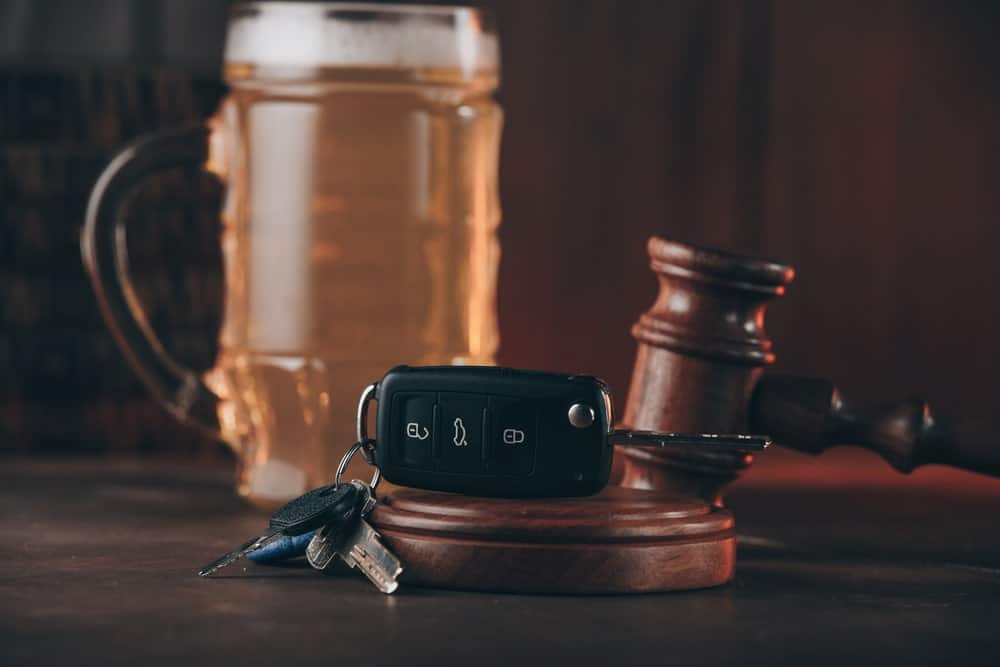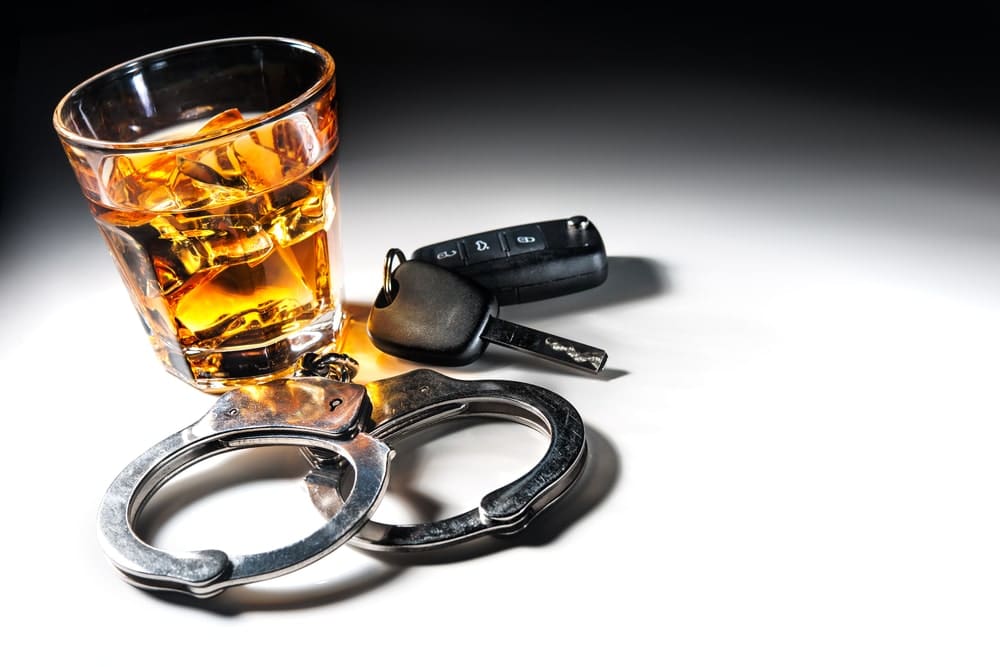Contrary to what some people suppose, operating a motor vehicle is a privilege, not a right, and therefore the privilege of operating a motor vehicle can be permanently revoked by the State of Maine.
The State of Maine has the ability to grant, take away, and reinstate driver’s licenses based on the performance and behavior of motorists, provided that the state’s actions are consistent for everyone.
Maine law regulates motorists in various ways, but one of the key ways is with its proscriptions on driving while under the influence of alcohol (or other intoxicating substances). In the past, we’ve touched on the topic of driving while under the influence under Maine law, but today we would like to focus more specifically on felony driving offenses. In this post, we will cover the details of felony instances of operating while under the influence, or “felony OUIs.”
As we will show in greater detail, the consequences for felony OUIs can be quite severe. For this reason, being hit with a charge of felony OUI is never something to approach lightly. If you’ve recently been hit with a felony OUI allegation, or think you may soon be hit with such a charge in the near future, you need to reach out for competent legal representation immediately.
Hiring a capable attorney can mean a world of difference when it comes to possible penalties.
First, we will give a brief introduction, and then move to a detailed discussion on BAC results. From there, we will cover the various types of felony OUI offenses, and then possible punishments.
Call 207-571-8146 or contact us online to schedule a consult with one of our highly skilled criminal defense & OUI lawyers, serving Southern Maine, today.
Table of Contents
OUI / DUI Laws in Maine
Before we dive into the specifics of felony OUIs in Maine, let’s first briefly go over the essentials of OUIs in general. In Maine, the term OUI is used interchangeably with “DUI,” so these two terms aren’t intended to refer to separate crimes. Basically, an OUI occurs whenever a motorist operates a motor vehicle – not just automobiles, for other vehicles as well (boats, motorcycles, etc. – with an unacceptable blood alcohol content (“BAC”) level. It’s important for readers to nail down this critical point: the BAC level is the determining factor when it comes to classifying OUIs, not the driving quality exhibited by the motorist. If a motorist were driving down a neighborhood residential street, within the speed limit, and didn’t violate any other road rules, that motorist would still be guilty of OUI if he or she had an impermissible BAC level. The key thing is the BAC level, not the driving performance, when it comes to classifying and prosecuting OUI offenses.
At the present time, a BAC level of 0.08% is a presumption that the driver was driving under the influence of alcohol. This is the BAC level which applies to all motorists, regardless of age. However, for drivers under the age of 21, if that person has any measurable amount of alcohol in his or her blood, that driver is guilty of violation of a license restriction, which would result in a 1-year loss of license. So, an underage driver with a BAC level of just 0.01% would be guilty of a crime in Maine!
Understanding BAC Results
Naturally, given the extreme importance of BAC results in the context of OUI law, we need to firmly understand the science of these results. There are multiple ways to derive a BAC level from a motorist, and there are numerous options for each way. For instance, BAC can be obtained with a “breath test,” using a breathalyzer device; there are different types of devices available, and certain devices may have higher levels of functionality (and therefore accuracy) than others. As we have discussed elsewhere in more detail, depending on the exact circumstances, a person charged with OUI may be able to undermine the allegation by challenging the validity of the BAC results. Undermining an allegation in this manner isn’t simple, however, and so you need a trained professional to provide assistance.
Types of Felony OUI’s in Maine
Technically, Maine law doesn’t have a separate category for “felony OUI,” but certain OUI crimes will be treated as felonies because of their level of severity. In Maine, any crime which is classified as either a Class A, Class B, or Class C offense will be regarded as a felony crime. Accordingly, third offense OUIs, fourth offense OUIs, and subsequent OUIs are treated as felonies in Maine as these crimes meet this standard.
Third Offenses
After a driver commits his or her third OUI offense, this third offense will bump the crime into a higher (i.e. more serious) classification. Third offenses are treated as Class C crimes, and are accordingly regarded as felonies. As we will discuss in detail below, the possible punishments for these offenses are severe. Moreover, in addition to the consequences referenced below (in our section on punishments), readers should know that third OUI offenses can also result in the installation of an ignition interlock device (“IID”), a mechanism which restricts a motorist from freely operating his or her own motor vehicle.
Fourth Offenses
Surprisingly, fourth offense OUIs are also classified as Class C crimes in Maine, and consequently they carry roughly the same possible consequences as third offenses. However, as we will point out below, these offenses do carry somewhat harsher punishment, and the likelihood of receiving a penalty at the high end of the range becomes much greater. In other words, although the maximum jail time for a fourth offense OUI is also 5 years, there is a greater probability that a fourth offense perpetrator will receive the maximum sentence as compared to a third offense perpetrator.
Aggravated OUI Offenses
Aggravated OUI offenses are those which involve behaviors which the State of Maine regards as more serious than a “normal” or standard offense, and consequently should carry harsher penalties. For instance, if an OUI perpetrator has a passenger who is under 21 years of age in his or her motor vehicle at the time of the offense, this will be treated as an aggravated incident, which would result in a mandatory minimum period of 48 hours jail time for a first offense. Also, if the driver’s conduct resulted in significant bodily harm to another person, then this will also be regarded as an aggravated felony OUI. Similarly, if the perpetrator’s conduct results in the death of another person, that will also be considered an aggravated OUI. At present, an aggravated felony OUI which involves bodily harm to another person is classified as a Class B crime, while those incidents which involve a death are classified as Class A crimes for manslaughter.
OUIs Which Occur after a Felony OUI
Another important point to make is that, after an offender has been convicted of a “felony OUI” in Maine, any subsequent OUI conviction will be treated as a Class B crime. This means that the offender will receive the mandatory minimum penalties associated with Class B OUI offenses, and also be more likely to receive punishment at the high end of the range.
Another fact to know is that operating a vehicle while on a suspended license carries separate penalties. So, a person caught operating a motor vehicle with a suspended license will face additional jail time and fines, and also may be subject to vehicle seizure. This is something which relatively few Maine residents know about: if you’re caught driving with a suspended license, the state can literally seize your vehicle from you and sentence you to jail for a long time period!
Penalties for Felony OUIs
As mentioned, the penalties for felony OUIs can be harsh, and the logic of this is that these offenses clearly indicate that the driver has a significant problem for which jail time as a punishment might be appropriate. For a “third offense OUI,” the penalty structure is as follows: (1) there is a mandatory jail sentence of 30 days, and also a mandatory fine of $1,100, along with the loss of one’s driving privilege for 6 years; (2) both of these minimums are increased to 40 days and $1,400, respectively, if the offender refused to submit to a BAC test. Third offense OUIs are classified as a Class C crime, and carries a maximum prison sentence of 5 years, and a maximum financial penalty of $5,000.
For fourth offense OUIs, as well as subsequent offense OUIs (i.e. fifth, sixth, etc.), the penalty structure is as follows: (1) the mandatory jail sentence is increased to 6 months, and a minimum fine of $2,100, and the loss of the offender’s driving privilege for a minimum of 8 years; (2) for offenders who refuse to submit to the BAC test, these minimums are increased to 6 months and 20 days, and $2,500. Fourth offense OUIs are likewise classified as Class C crimes in Maine, and carry maximum punishments of 5 years in jail and up to $5,000.
For aggravated OUI offenses, the possible punishments vary depending on the exact nature of the crime. For a Class C offense, which involves bodily injury, the minimum jail sentence is 6 months, the minimum fine is $2,100, and the loss of one’s driving ability for a minimum of 6 years. The maximums are 5 years in jail and up to $5,000. For Class B offenses, which typically involve a 5th offense, the minimum jail sentence is also 6 months, and the minimum find also $2,100, but the motorist is exposed to a maximum of 10 years in prison and a fine of up to $20,000.
Contact our OUI defense lawyers today
As you can see, felony OUIs are treated with more than a bit of harshness here in the State of Maine, and Maine’s criminal justice system views this treatment as being fully consistent with the seriousness of these crimes. As we know, the statistics on drinking and driving (as well as driving under the influence of other intoxicants) show that OUI offenses cause far too many fatalities in the State of Maine, and also cause far too many serious injuries. In fact, OUIs cause more deaths and more injuries on a yearly basis than any other type of crime! The cost to society is simply too great to not take these offenses very seriously. Accordingly, those convicted of a felony OUI can almost certainly look forward to a rather severe punishment. This is why finding a capable defense attorney is so vital.
If a person is convicted of felony OUI, not only will that person face a jail sentence, plus a fine, plus a license suspension, he or she will also be saddled with a criminal record. Criminal records can be highly destructive, as these records can impair a person’s ability to gain certain types of employment. If you want to protect your future, you need to obtain a qualified defense attorney as soon as you are hit with charges. To learn more, contact the Maine Criminal Defense Group today by calling 207-571-8146.
Call 207-571-8146 or contact us online to schedule a consult with one of our highly skilled criminal defense & OUI lawyers, serving Southern Maine, today.
OUI Blog Articles

January 11th, 2025, in Skowhegan, Maine, a Maine Department of Transportation plow truck sustained a head-on collision caused by a drunk driver on Route 2, as reported by law enforcement.[...]

The tragic events of a fatal car crash in 2023 that claimed the lives of four young people have finally reached a pivotal legal outcome. Noelle Tavares, a former Maine[...]

In most states, there are many different places that the average person can take a driving course to satisfy court requirements as related to an DUI conviction. However, in the[...]

Defending against OUI offenses in Southern Maine Anyone charged with a 2nd OUI in Maine should expect little leniency from the criminal justice system. This makes it even more important[...]

Defending against OUI Refusals in Southern Maine Did you know that it is a criminal offense to refuse to submit to a chemical test if lawfully requested to do so[...]

Reducing an OUI charge in Maine OUI charges are handled severely in Maine. For many people, a drunk-driving charge is their first time dealing with the criminal justice system and,[...]

Alcohol laws of Maine While you should be aware of the strict OUI laws in Maine, it’s also important to know about other ways you can face a traffic infraction[...]

Defending against OUI offenses in Southern Maine A first OUI in Maine can potentially have long-term consequences, but with the right legal representation, alleged offenders can escape the harshest penalties.[...]

If you blow under .08 in a DUI breath test in Maine, it may be jumping the gun to breathe a huge sigh of relief. You may not be “free[...]

Last Updated: February 18, 2025 Between 11 and 15 million Americans visit Canada each year but you’re unlikely to contribute to those numbers in the future if you have an[...]


